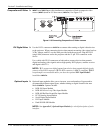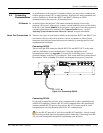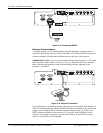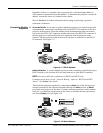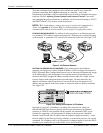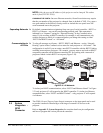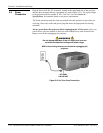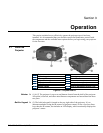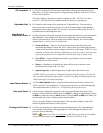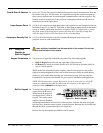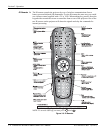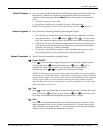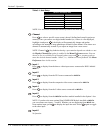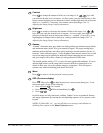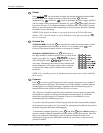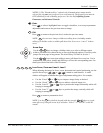
Section 3: Operation
3-2 Christie DS+60/DW30/Matrix 3000 User’s Manual 013-100149-02 Rev. 1 (01/07)
(3) The AC receptacle is located on the right side of the projector (opposite side of
lamp doors). Use this outlet to plug in an appropriately rated line cord. See 2.6 Power
Connection for details.
The input voltage to the projector must be capable of 100 – 240 VAC. See also
Section 6 – Specifications for complete details on all power requirements.
(4) Located on the bottom of the projector are 3 adjustable feet. You can raise or
lower these feet to ensure the projector is level on all sides and the image displays
rectangular without any keystone. See Projector Position and Mounting (Section 2)
for instructions on adjusting these feet.
(5) The projector is built with a motorized lens mount that allows for easy lens control
and adjustment. This includes such functions as adjusting vertical and horizontal
offsets, zoom and focus. The lens mount can be fitted with any one of the available
optional lenses – see Section 6 - Specifications.
• Zoom and Focus – There are two internal lens motors that allow for quick
motorized adjustment of zoom and focus. Adjust zoom to fit the displayed image
on the screen and adjust focus to improve the clarity of the image. NOTE: You can
manually override zoom and focus adjustments set with the remote. Turn the outer
ring on the projection lens to adjust focus and the inner ring to adjust zoom.
• Lens Offset – Vertical and horizontal offset is performed on the lens mount
through the use of DC motors.
• Shutter – Standard on all models the shutter allows you to turn the screen
absolutely black when in the “on” state.
• Optical Aperture –Enables adjustment of light output and contrast ratio.
NOTES: 1) The projection lens is shipped separately from the projector. 2) Use the
lens cap when transporting the projector to avoid scratching and damaging the lens,
which could affect your displayed image.
(8) The
LENS RELEASE button, located just below the projection lens, allows for a
quick “tool-free” lens changeover. For instructions on how to use this button during
lens replacement refer to Section 4 – 4.5 Replacing the Projection Lens.
(10) All source connections are made to the input panel located at the back of the
projector. Connect RGB or YPbPr sources to
INPUT 1, analog or digital display signals
to
INPUT 2, composite video to INPUT 3, and S-video to INPUT 4. INPUT 5 is where you
would install any of the available optional input modules.
There is no status display on the input panel. The only status display is part of the
built-in keypad located on top of the projector.
(9) There are numerous air vents located around the projector. It is important these
vents remain unobstructed. Allowing adequate airflow through the projector will
prevent it from overheating.
NOTE:
Stand clear of the rear exhaust air path during operation. In the unlikely
event of a lamp explosion, glass particles can be blown out of these vents.
AC rece
p
tacle f
Ad
j
ustable Feet f
Lens Mount &
Pro
j
ection Lenses f
Lens Release Button f
Rear In
p
ut Panel f
Coolin
g
and Air Vents f



